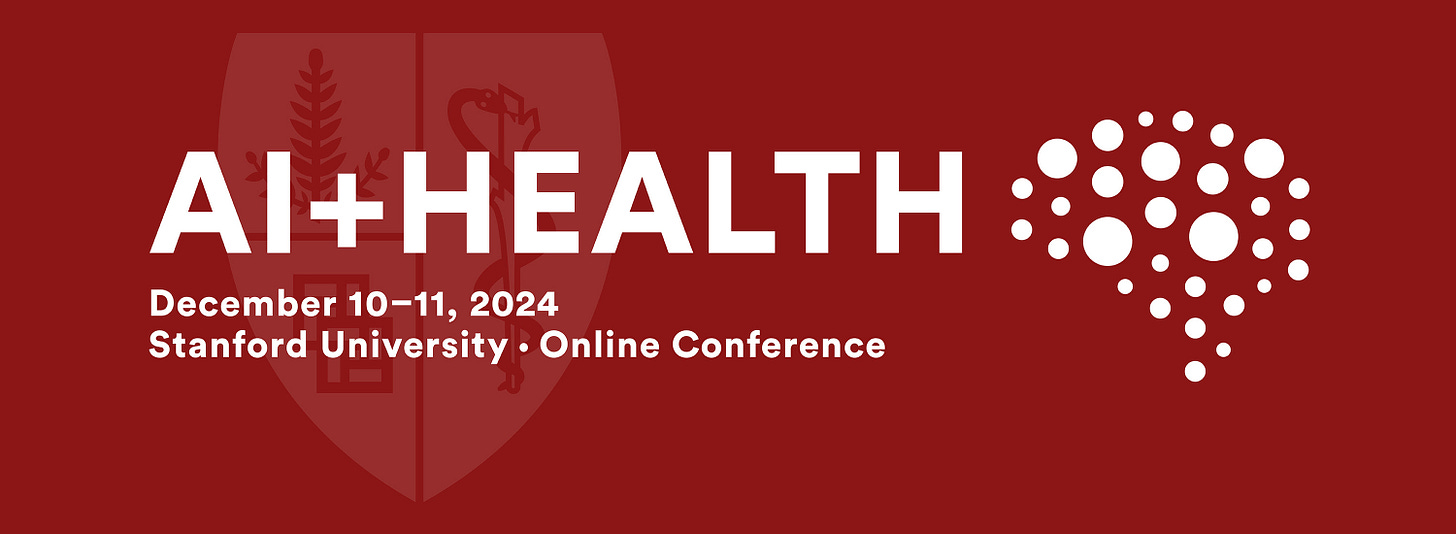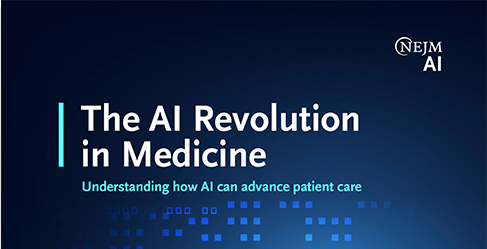🏥 AI Speeds Up Hospital Reporting, 🔊 AI Voice Analysis Detects Early Depression in Seniors, 👨⚕️ AIIMS Empowers Doctors with AI Education - Dive into the Latest Med AI Updates! 🚀
Updates on Artificial Intelligence & Emerging Technologies in Medicine 🤖💊
“I encourage people to push [AI] for the unknown. I think everyone knows someone who is suffering from a health condition that needs something beyond what we can offer today.” - Jessica Mega, MD, MPH, Stanford cardiologist and a co-founder of Alphabet’s Verily
Dear Med AI Enthusiast,
Welcome to The ‘Med AI’ Capsule newsletter - your go-to source for exploring how AI and emerging technologies are transforming medicine. ⚕ Whether you're a medical professional 👩⚕️, a tech enthusiast 💻, or simply curious 🧠, The 'Med AI' Capsule is for you! Stay ahead of the curve with the latest trends, insights, and updates in the rapidly evolving world of AI and emerging technologies in medicine. 🚀
In today’s capsule:
3 News Updates, 3 Research Papers
2 Learning Resources, 2 Upcoming Events
1 Startup Spotlight, 1 Knowledge Quiz
Reading Time: 7-10 minutes
Exciting News! You can now enjoy this newsletter edition in a new, accessible format. Click below to listen to the podcast version and dive deeper into our latest insights and stories.
News Updates 📰
1. 🩺 AI Enhances Hospital Reporting: UCSD Study Shows Faster, Accurate Data Processing
UC San Diego researchers found AI can match human efficiency in analyzing patient charts for quality measures while completing the task much faster.
Why Important: This could improve hospital care, reduce paperwork, and save costs by minimizing manual data processing.
“The integration of LLMs into hospital workflows holds the promise of transforming health care delivery by making the process more real-time, which can enhance personalized care and improve patient access to quality data. As we advance this research, we envision a future where quality reporting is not just efficient but also improves the overall patient experience." - Prof Peter Johnson, National Clinical Director for Cancer at NHS England
Caution: Such AI systems still need more testing and validation by human experts before they can be fully relied on in hospitals to avoid mistakes in critical areas.
2. 🔊 Singapore Develops AI to Detect Early Depression in Seniors Through Voice Analysis
Singapore's "SoundKeepers" project uses AI voice analysis to detect early depression in seniors and provides community support to prevent dementia.
Why Important: By studying changes in how they speak, the AI can spot potential problems before they become more serious.
"We need new ways to listen to our seniors. While they may not express their worries through words, we can now try to hear it through their voices." - Lien Foundation CEO Lee Poh Wah
Caution: Concerns about data privacy and whether AI can be accurate enough for complex diagnoses will need to be addressed for successful adoption.
3. 👨⚕️ AIIMS Delhi Hosts Workshop to Train Doctors on Leveraging AI for Advanced Healthcare Solutions
AIIMS Delhi held a workshop training doctors on using AI to enhance patient care through data analysis, pattern recognition, and decision-making, while stressing ethical AI use.
Why Important: Such initiatives empower doctors to use AI to enhance patient care through better diagnostics and treatment while ensuring ethical and equitable healthcare practices.
“By focusing on practical applications (of AI) and real-world challenges, we are preparing our future healthcare leaders to innovate and improve patient outcomes significantly.” - Dr. Kanwalpreet Kochhar, the in-charge of Cognitive Neurophysiology and Nutrition Lab, AIIMS
Caution: Over-reliance on AI in healthcare risks diminishing essential clinical skills and patient-centered care, emphasizing the need for a balanced approach.
Startup Spotlight ✨
Quadrivia.AI is a pioneering AI-powered assistant designed by clinicians, for clinicians. The platform, known as 'Qu,' offers comprehensive, controllable, and customizable solutions tailored to the specific needs of every clinician and patient.
The platform emphasizes safety and reliability, undergoing rigorous testing to ensure clinical accuracy. By automating routine tasks and managing patient journeys, 'Qu' supports clinicians in making faster, life-saving decisions and enhances patient care through seamless integration into existing workflows.
Latest Research Papers 🔬
Attitudes and perceptions of medical researchers towards the use of artificial intelligence chatbots in the scientific process: an international cross-sectional survey | The Lancet Digital Health - highlights substantial researcher interest in AI chatbots, indicating a strong need for clearer guidelines and formal training to understand their decision-making processes better.
Machine learning for predicting in-hospital mortality in elderly patients with heart failure combined with hypertension: a multicenter retrospective study | Cardiovascular Diabetology - developed a machine learning model using Random Forest to predict in-hospital mortality among elderly patients with heart failure and hypertension, showing high predictive accuracy and identifying critical factors like urea and albumin levels.
Proactive Care Management of AI-Identified At-Risk Patients Decreases Preventable Admissions | The American Journal of Managed Care - found that proactive care management for AI-identified at-risk patients significantly reduced preventable hospital admissions by 27%, showcasing the potential of AI integration in healthcare management.
Knowledge Quiz ❓
Mark your answer and think about it as you read through the remaining newsletter, and find the correct answer at the end!
Upcoming Events 🧑💻
Learning Resources 📚
Your feedback is crucial to me, as it helps me understand your interests and improve my offerings. I would appreciate it if you could take a few minutes to share your thoughts about what you've enjoyed and what you think I could do better.
Let’s wrap it up with a TL;DR: Quick recap! 🔍
UCSD research shows AI enhances hospital reporting with faster, accurate data processing, promising reduced costs and improved patient care.
Singapore's "SoundKeepers" project uses AI to detect early signs of depression in seniors through voice analysis, aiming for early intervention.
AIIMS Delhi hosts a workshop training doctors in AI to improve healthcare decisions while highlighting ethical AI use.
Quadrivia.AI, designed by clinicians, aims to streamline healthcare in North America with AI-powered assistance for clinicians.
Recent studies show significant interest in AI among medical researchers, successful predictive modeling for patient outcomes in heart failure cases, and effective AI-driven interventions that reduce preventable hospital admissions.
Upcoming events include the Doctors AI Global Summit 2024 and Stanford AI+Health 2024, showcasing the latest AI advancements in healthcare.
Learning resources featured are Navigating AI: A Quick Start Guide for Healthcare Professionals and The AI Revolution in Medicine - a short publication by NEJM AI, providing foundational knowledge and current insights into AI applications in the medical field.
Exciting News! You can now enjoy this newsletter edition in a new, accessible format. Click below to listen to the podcast version and dive deeper into our latest insights and stories.
Stay tuned for our upcoming editions as we explore the latest breakthroughs and dive deep into the transformative power of artificial intelligence and emerging technologies, shaping a healthier future. 🚀
Warm regards,

Disclaimer: The content in this newsletter was partly curated and summarised using AI LLMs, which can make mistakes. Please check all important information. For any issues or inaccuracies, please notify me on avneeshkhareonline@gmail.com.







